小学英语时态专项训练
- 格式:doc
- 大小:224.50 KB
- 文档页数:22
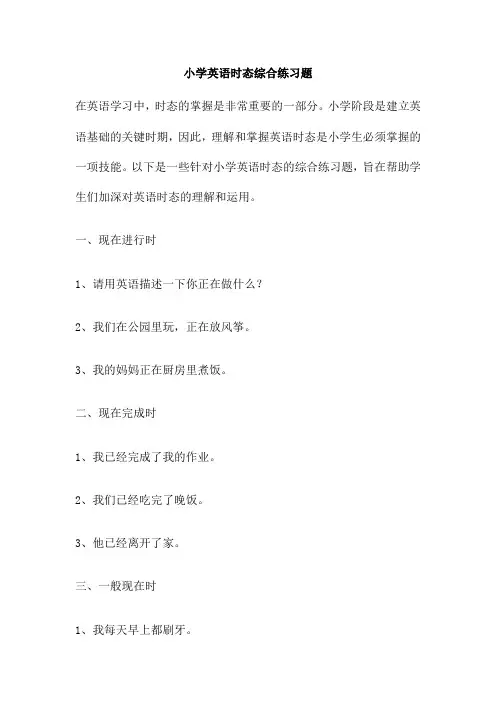
小学英语时态综合练习题在英语学习中,时态的掌握是非常重要的一部分。
小学阶段是建立英语基础的关键时期,因此,理解和掌握英语时态是小学生必须掌握的一项技能。
以下是一些针对小学英语时态的综合练习题,旨在帮助学生们加深对英语时态的理解和运用。
一、现在进行时1、请用英语描述一下你正在做什么?2、我们在公园里玩,正在放风筝。
3、我的妈妈正在厨房里煮饭。
二、现在完成时1、我已经完成了我的作业。
2、我们已经吃完了晚饭。
3、他已经离开了家。
三、一般现在时1、我每天早上都刷牙。
2、我们每周都去公园玩。
3、他每天晚上都读书。
四、一般过去时1、昨天我去了电影院。
2、上周我们去了海滩。
3、昨晚她看了电视。
五、一般将来时1、我明天将要完成作业。
2、我们下周将要去看电影。
3、他将在下个月搬到新家。
以上练习题旨在帮助学生理解和掌握基本的英语时态。
对于小学生来说,时态的学习可能相对复杂,但通过反复练习和实际应用,他们可以逐渐掌握并开始在日常生活中运用这些时态。
教师和家长可以鼓励学生多做类似的练习,帮助他们提高英语时态的理解和运用能力。
小学英语时态练习题一、一般现在时1、I eat apples every day. (我每天吃苹果。
)2、He studies hard every day. (他每天努力学习。
)3、They play basketball every week. (他们每周打篮球。
)二、现在进行时1、I am eating apples now. (我现在正在吃苹果。
)2、He is studying hard now. (他现在正在努力学习。
)3、They are playing basketball now. (他们现在正在打篮球。
)三、一般过去时1、I ate apples yesterday. (我昨天吃了苹果。
)2、He studied hard yesterday. (他昨天努力学习了。
)3、They played basketball yesterday. (他们昨天打篮球了。
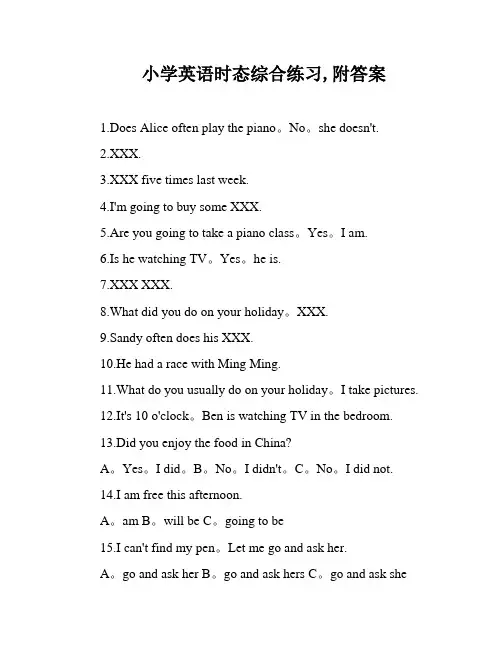
小学英语时态综合练习,附答案1.Does Alice often play the piano。
No。
she doesn't.2.XXX.3.XXX five times last week.4.I'm going to buy some XXX.5.Are you going to take a piano class。
Yes。
I am.6.Is he watching TV。
Yes。
he is.7.XXX XXX.8.What did you do on your holiday。
XXX.9.Sandy often does his XXX.10.He had a race with Ming Ming.11.What do you usually do on your holiday。
I take pictures.12.It's 10 o'clock。
Ben is watching TV in the bedroom.13.Did you enjoy the food in China?A。
Yes。
I did。
B。
No。
I didn't。
C。
No。
I did not. 14.I am free this afternoon.A。
am B。
will be C。
going to be15.I can't find my pen。
Let me go and ask her.A。
go and ask her B。
go and ask hers C。
go and ask she16.Fangfang is a good student。
She is good at maths.A。
does good at B。
well do it C。
is good at17.Are you washing clothes?A。
Yes。
you are。
B。
Yes。
I am。
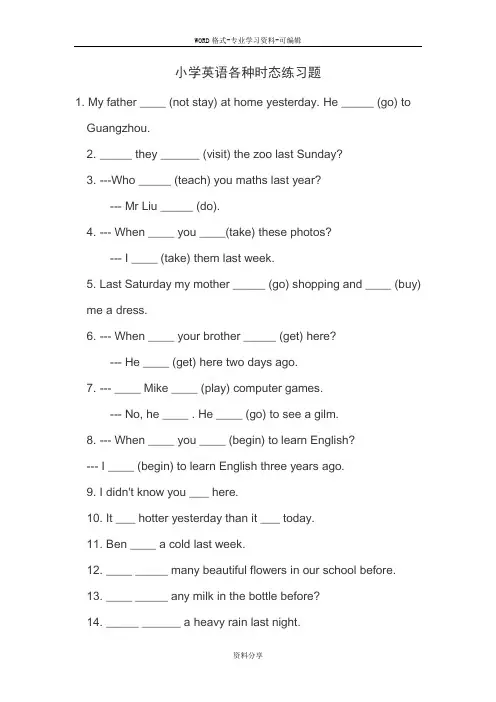
小学英语各种时态练习题1. My father ____ (not stay) at home yesterday. He _____ (go) to Guangzhou.2. _____ they ______ (visit) the zoo last Sunday?3. ---Who _____ (teach) you maths last year?--- Mr Liu _____ (do).4. --- When ____ you ____(take) these photos?--- I ____ (take) them last week.5. Last Saturday my mother _____ (go) shopping and ____ (buy) me a dress.6. --- When ____ your brother _____ (get) here?--- He ____ (get) here two days ago.7. --- ____ Mike ____ (play) computer games.--- No, he ____ . He ____ (go) to see a gilm.8. --- When ____ you ____ (begin) to learn English?--- I ____ (begin) to learn English three years ago.9. I didn't know you ___ here.10. It ___ hotter yesterday than it ___ today.11. Ben ____ a cold last week.12. ____ _____ many beautiful flowers in our school before.13. ____ _____ any milk in the bottle before?14. _____ ______ a heavy rain last night.1. Listen! Who ____ (speak) English in the library?2. She _____ (like) music. Now she _____ (sing).3. Don't _____ (run) in the street.4. _____ you _____ (go) to school every day?5. Class is over. The pupils ______ (play) games.6. It's 6:30. I _____(get) up.7. Look, the pupils ____ (have) an English class.8. My mother _____ (wash) the bowls in the kitchen now.9. He ____ (like) art very much. He ____ (draw) a horse now.10. Let the children go away. They ____ (make) noise here.1. We____ (visit) the Great Wall next month.2. My father _____ (fly) to Beijing tomorrow.3. You ____ (have) a seven-day holiday soon. What ___ you ____ (do)?4. Next week David ____ (visit) the new zoo in Panyu.5. ____ you _____ (borrow) books from the library tomorrow?6. My pen is broken. I ____ (buy) a new one this Saturday.7. They ____ (have)a picnic in the park this Sunday.8. I ____ (write) a letter this evening.9. He ____ (make) a kite this Saturday.10. My mother _____ (cook) some delicious food this weekend.1.My mother ____(work) in a primary school and I ____ (study) in the same school.2.I ____ (have) a bike and Ben ____ (have) a bike, too.3. My sister ____ (be) a pupil. She ____ (study) very hard.4. Who ___ (cook) breakfast for your family?5. My father is a teacher. He ____ (teach) Chinese in a primary school.6. He ____ (be) strong. He can ___ (carry) the heavy box.7. John ____ (go) to school by bike every day.8. Kate often ___ (play) table tennis with her friends.9. My mother often ___ (go) shopping and ___ (buy) some vegetbales in the market.10. --- Who ____ (study) hardest in your class?一一般过去式,注意动词的过去式的变化1 didn't stay, went2 Did, visit3 taught, did4 did, take, took5 went, bought6 did, get, got7 Did, play, didn't, went8 did, begin, began9 were10 was, is11 had12 There were13 Was there14 There was二一般进行时,主要注意动词的现在分词的变化1 is speaking2 likes, is singing3 run4 Do, go5 are playing6 am getting7 are having8 are washing9 likes, is drawing10 are making三一般将来时be going to1 are going to visit2 are going to fly3 are having, are, going to do4 is going to visit5 Are, going to borrow6 am going to buy7 are going to have8 am going to write9 is going to make10 is going to make四一般现在时主要注意动词的第三人称单数的变化规则1 works, study2 have, has3 is, studies4 cooks5 teaches6 is, carry7 goes8 playes9 goes, buys10 studies。

小学六年级英语时态专项改错训练题总复习附答案________________________________________________5.It's christmas morning.________________________________________________4、改错。
1.They are listen quietly.__________________________________________2.Is these dishes clean or dirty?__________________________________________3.Jenny want to fly kites.__________________________________________4.The cabbage is on the sink.__________________________________________5.Danny is sit in a chair.__________________________________________5、Read and write.(找出下列句子中的错误,将正确的句子写在横线上) 1.She is a old woman.2.She name is Amy.3.Don't is late next time.4.I haven't find my dog.5.He reading a story-book.6、改错,每句话只有一处错误,把正确的句子写在横线上。
1.They are listen quietly.__________________________________________________2.Is these dishes clean or dirty?__________________________________________________3.Jenny want to fly kites.__________________________________________________4.The cabbage is on the sink.__________________________________________________5.Danny is sit in a chair.__________________________________________________7、改错,将正确的句子写在横线上。
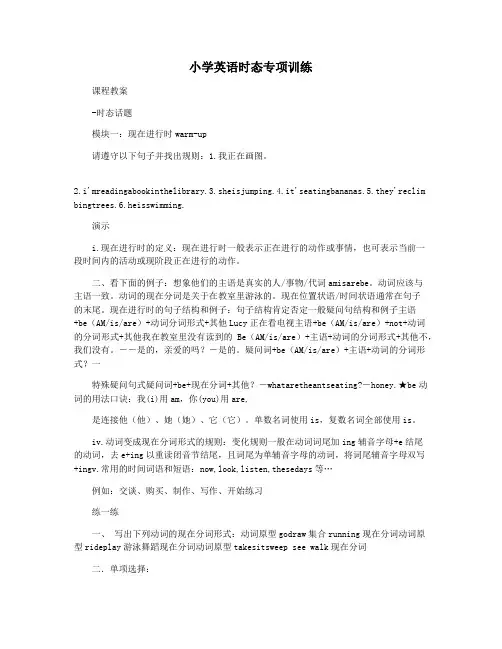
小学英语时态专项训练课程教案-时态话题模块一:现在进行时warm-up请遵守以下句子并找出规则:1.我正在画图。
2.i'mreadingabookinthelibrary.3.sheisjumping.4.it'seatingbananas.5.they'reclim bingtrees.6.heisswimming.演示i.现在进行时的定义:现在进行时一般表示正在进行的动作或事情,也可表示当前一段时间内的活动或现阶段正在进行的动作。
二、看下面的例子:想象他们的主语是真实的人/事物/代词amisarebe。
动词应该与主语一致。
动词的现在分词是关于在教室里游泳的。
现在位置状语/时间状语通常在句子的末尾。
现在进行时的句子结构和例子:句子结构肯定否定一般疑问句结构和例子主语+be(AM/is/are)+动词分词形式+其他Lucy正在看电视主语+be(AM/is/are)+not+动词的分词形式+其他我在教室里没有读到的Be(AM/is/are)+主语+动词的分词形式+其他不,我们没有。
――是的,亲爱的吗?―是的。
疑问词+be(AM/is/are)+主语+动词的分词形式?一特殊疑问句式疑问词+be+现在分词+其他?―whataretheantseating?―honey.★be动词的用法口诀:我(i)用am,你(you)用are,是连接他(他)、她(她)、它(它)。
单数名词使用is,复数名词全部使用is。
iv.动词变成现在分词形式的规则:变化规则一般在动词词尾加ing辅音字母+e结尾的动词,去e+ing以重读闭音节结尾,且词尾为单辅音字母的动词,将词尾辅音字母双写+ingv.常用的时间词语和短语:now,look,listen,thesedays等…例如:交谈、购买、制作、写作、开始练习练一练一、写出下列动词的现在分词形式:动词原型godraw集合running现在分词动词原型rideplay游泳舞蹈现在分词动词原型takesitsweep see walk现在分词二.单项选择:1.听着!她在厨房里。
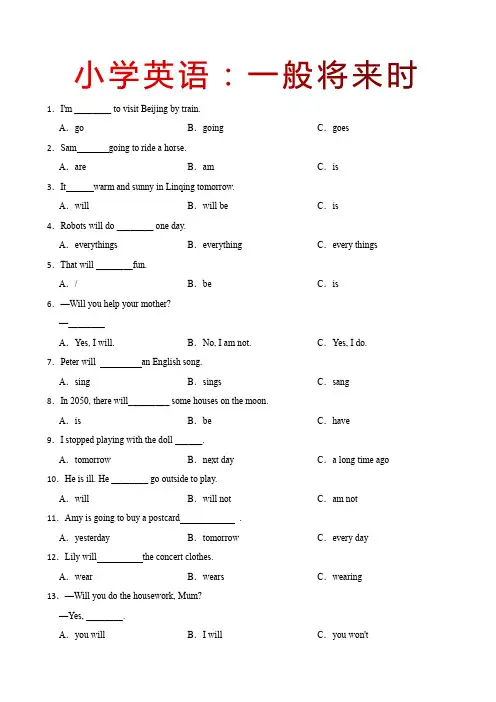
1.I'm ________ to visit Beijing by train.A.go B.going C.goes 2.Sam going to ride a horse.A.are B.am C.is3.It warm and sunny in Linqing tomorrow.A.will B.will be C.is 4.Robots will do ________ one day.A.everythings B.everything C.every things 5.That will ________fun.A./B.be C.is6.—Will you help your mother?—________A.Yes, I will.B.No, I am not.C.Yes, I do. 7.Peter will an English song.A.sing B.sings C.sang8.In 2050, there will_________ some houses on the moon.A.is B.be C.have9.I stopped playing with the doll ______.A.tomorrow B.next day C.a long time ago 10.He is ill. He ________ go outside to play.A.will B.will not C.am not 11.Amy is going to buy a postcard .A.yesterday B.tomorrow C.every day 12.Lily will the concert clothes.A.wear B.wears C.wearing 13.—Will you do the housework, Mum?—Yes, ________.A.you will B.I will C.you won't14.— ________________ Alice go to Shanghai by bus this Friday?— No, by car.A.Do B.Will C.Is15.Mike ________ visit his grandpa tomorrow.A.is going B.is going to C.go16.They_______ going to go to school.A.is B.are C.am 17.Mum will ________ a new bag for me.A.to buy B.buys C.buy 18.—Where is Mr. Zhang?—He________ the soil in the garden. He________ some flowers.A.is digging; is going to plant B.dig; is plantingC.is digging; is planting D.digs; is going to plant 19.—What will the weather be tomorrow?—It will ________.A.snow B.snowy C.be snow 20.There a fashion show tomorrow afternoon.A.is going to B.will be C.is going to have 21.—Are you going to ________ home at five o'clock?—Yes,I am.A.be B.is C.are 22.—When are you going to Beijing?— .A.Last weekend B.This weekend C.Yesterday 23.We __________have a picnic.A.is going to B.are going to C.are going 24.Li Ming will ______to the shop.A.walks B.walk C.walking25.I will _____________ you.A.missing B.misses C.miss26.I'm going to ____________ my cousin ________________ New York.A.visits; in B.visits; on C.visit; in D.visit; on 27.It will __________ three hours.A.take B.takes C.use D.uses 28.I'm going to visit Mr Li and ________ him some questions.A.to ask B.asks C.ask 29.Robots will ________ everything.A.do B.does C.did 30.—Lily , what will you do ?—_____________ .A.I will listen to music.B.She will play football.C.Yes , she will.31.I _____ the Great Wall next year.A.go to visit B.will visit C.visited 32.He will ________ our new English teacher.A.be B.is C.are33.I _____ presents for my parents tomorrow.A.buy B.am going buy C.will buy 34.Jim, with his friends _____ going fishing this afternoon.A.is B.are C.were D.was 35.— Are you going to run on sports day?—_____________A.Yes, I can.B.No, I am.C.Yes, I am. 36.I am _____to an art museum tomorrow.A.go B.going C.goes 37.There will ______air and clean water on Mars.A.be fresh B.fresh C.is fresh 38.Please write and I will ________ your questions.A.answers B.answer C.to answer 39.We ____ going to swim in the sea.A.is B.are C.am40.There will __________ a light snow next Friday.A.be B.being C.is41.I'll put _____ my clothes. It is too cold.A.on B.up C.away 42.My family going to get together and a big dinner.A.is; has B.is; have C.are; have 43.—Will it snow in Changchun?—No,________.A.it will B.it's will C.it won't 44.I'll see a film ____________.A.yesterday B.tomorrow C.last week 45.May day is ______.A.coming B.come C.come on 46.It will ___________ in Xi'an tomorrow.A.windy B.be windy C.be snow 47.Mike and I _______ going to see a film.A.is B.are C.am 48.—________ he take his ball tomorrow?—Yes, he will.A.Does B.Is C.Will 49.This summer I will __________________ some new dresses.A.buy B.buys C.bought 50.We ____________ get up at six tomorrow.A.is going to B.are C.are going to答案解析部分1.B2.C3.B4.B5.B6.A7.A8.B9.B10.B11.B12.A13.B14.B15.B16.B17.C18.A19.A20.B21.A22.B23.B24.B25.C26.C27.A28.C29.A30.A31.B 32.A 33.C 34.A 35.C 36.B 37.A 38.B 39.B 40.A 41.A 42.C 43.C 44.B 45.A 46.B 47.B 48.C 49.A 50.C1.It will __________ tomorrow. But it won't be heavy.A.rains B.rain C.raining 2.My mother will________ a new bike for________.A.buys; me B.buy; me C.bought; mine 3.There ________ a library in two years near my home.A.was B.is C.will be 4.She wear glasses in the future.A.is B.won't C.not D.aren't 5.John ____________________ Beihai Park next week.A.visits B.is visiting C.will visit 6.So I will play football ________.A.Sunday B.yesterday(昨天)C.tomorrow 7.I _________________ wear glasses in the future.A.don't B.won't C.am not8.I'm going to _____basketball with my dad.A.plays B.play C.playing 9.We ______have a football match tomorrow.A.are going B.are go to C.are going to 10._________there be many pupils?A.Is B.Will C.Where11.I'm going to ________ tennis lessons.A.taking B.took C.take12.It will windy in Beijing.A.go B.be C.to 13.Daming says he _______ to you soon.A.write B.will write C.writing 14.Mike is going to ______the Monkey King.A.be B.is C.am15.—What will you do tomorrow?—________A.We'll do the housework. B.We'll read our books.16.It will be sunny ________ Sunday.A.in B.on C.at17.The students football over there this afternoon.A.Play B.are playing C.are going to play 18.They are going to clean the classroom________.A.last Friday B.yesterday C.this afternoon 19.I will the young trees every day.A.water B.waters C.watering 20.Tomorrow Tim and Anne will ____to the zoo.A.going B.goes C.go21.I am going to ________ an ice cream.A.eat B.ate C.eating 22.What is he going to_____?A.see B.seeing C.sees 23.What will you ________________?A.did B.do C.doing 24.There _________ be a new film tomorrow.A.would B.will C.can25.My father will ________ home at five o'clock.A.be B.am C.is26.I'm going to _________ a class.A.has B.have C.having 27.Let's meet here____15 minutes.A.in B.at C.on 28.Danny is going to ________ Jenny to play games.A.teach B.teaches C.teaching29.Sarah will go shopping with her mother _______.A.last weekend B.now C.next weekend 30.Where will she ________ this Sunday?A.goes B.go31.They ________ goodbye to their primary school soon.A.are going to say B.says C.said32.I will fly ________next Sunday.A.house B.to home C.home 33.We ____ go to the cinema this evening, but my father_______.A.will, will B.are, isn't C.will, won't 34.What time will the meeting ________?A.begin B.begins C.beginning 35.______________we'll go back to Canada.A.Yesterday B.Sunday C.Tomorrow 36.Ms. White will ________our English teacher.A.be B.is C.have 37.— Will your parents go to Hong Kong next month?—No, ___________.A.they won't B.they don't C.they aren't 38.Look at the cloud. It ________ rain soon.A.will B.is C.was 39.Joe and Peter going to visit Ms. Liu this weekend.A.is B.are C.will40.It will ________ all right. Don't worry.A.be B.is C.was 41.—_____ will you do this holiday ?—I will visit Shanghai.A.Where B.What C.Whose 42.We will ________ next week.A.go swim B.go swimming C.go swiming 43.She will ______ to the library.A.goes B.go C.going 44.I will _____50 years old.A.am B.be C.is 45.There ______ any matches next week.A.won't have B.are C.won't be 46.One day, I'm _____visit the moon.A.going B.going to C.go to 47.I __________ get some fruit pies for you.A.will B.am C.do 48.______ you ______ basketball tomorrow afternoon?A.Do; play B.Are; playC.Are; going to play D.Will; playing 49.They will ____for a bike ride on SundayA.went B.going C.go 50.We are going to __________our primary school soon.A.leave B.left C.leaving答案解析部分1.B2.B3.C4.B5.C6.C7.B8.B9.C10.B11.C12.B13.B14.A15.B16.B17.C18.C19.A20.C21.A22.A23.B24.B25.A26.B27.A28.A29.C30.B31.A 32.C 33.C 34.A 35.C 36.A 37.A 38.A 39.B 40.A 41.B 42.B 43.B 44.B 45.C 46.B 47.A 48.C 49.C 50.A。
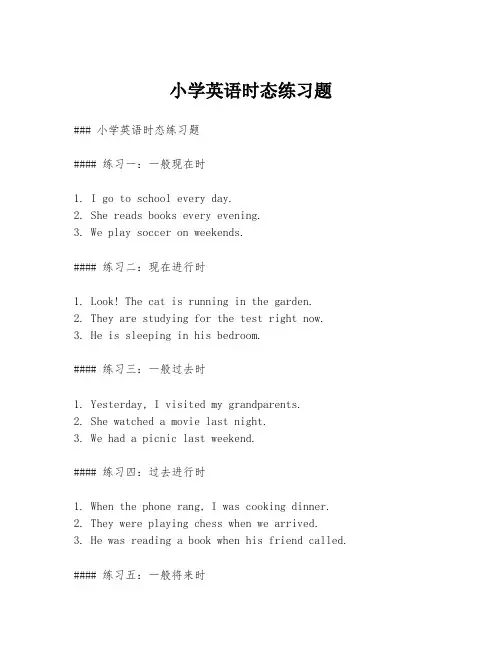
小学英语时态练习题### 小学英语时态练习题#### 练习一:一般现在时1. I go to school every day.2. She reads books every evening.3. We play soccer on weekends.#### 练习二:现在进行时1. Look! The cat is running in the garden.2. They are studying for the test right now.3. He is sleeping in his bedroom.#### 练习三:一般过去时1. Yesterday, I visited my grandparents.2. She watched a movie last night.3. We had a picnic last weekend.#### 练习四:过去进行时1. When the phone rang, I was cooking dinner.2. They were playing chess when we arrived.3. He was reading a book when his friend called. #### 练习五:一般将来时1. Tomorrow, I will go to the library.2. She will buy a new dress next week.3. We will have a party next month.#### 练习六:将来进行时1. By this time tomorrow, I will be studying for my exam.2. They will be traveling to Paris next year.3. He will be working on his project all day.#### 练习七:现在完成时1. I have finished my homework.2. She has seen that movie already.3. We have visited the museum twice.#### 练习八:现在完成进行时1. I have been studying English for two years.2. She has been working at the company for a year.3. They have been living in this city since 2010.#### 练习九:过去完成时1. By the time I arrived, she had already left.2. They had already finished their homework before the class.3. He had already eaten when I got to the restaurant.#### 练习十:过去将来时1. She said she would go to the party if she was invited.2. They thought they would have a great time at the concert.3. He believed he would win the race.注意:请在每个句子中填入正确的动词形式。
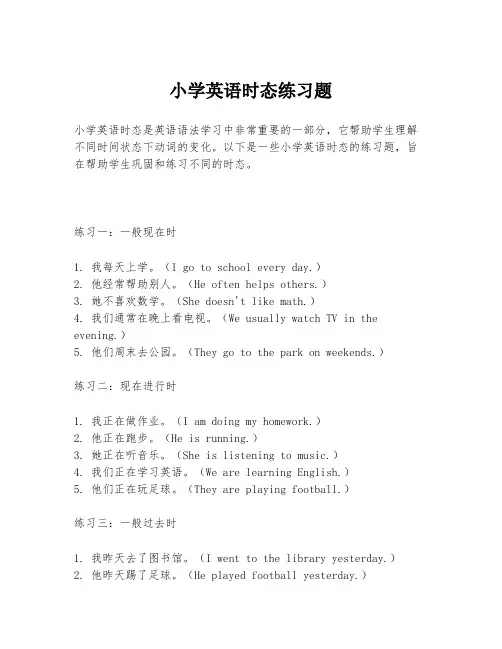
小学英语时态练习题小学英语时态是英语语法学习中非常重要的一部分,它帮助学生理解不同时间状态下动词的变化。
以下是一些小学英语时态的练习题,旨在帮助学生巩固和练习不同的时态。
练习一:一般现在时1. 我每天上学。
(I go to school every day.)2. 他经常帮助别人。
(He often helps others.)3. 她不喜欢数学。
(She doesn't like math.)4. 我们通常在晚上看电视。
(We usually watch TV in the evening.)5. 他们周末去公园。
(They go to the park on weekends.)练习二:现在进行时1. 我正在做作业。
(I am doing my homework.)2. 他正在跑步。
(He is running.)3. 她正在听音乐。
(She is listening to music.)4. 我们正在学习英语。
(We are learning English.)5. 他们正在玩足球。
(They are playing football.)练习三:一般过去时1. 我昨天去了图书馆。
(I went to the library yesterday.)2. 他昨天踢了足球。
(He played football yesterday.)3. 她昨天看了电影。
(She watched a movie yesterday.)4. 我们昨天去了动物园。
(We went to the zoo yesterday.)5. 他们昨天看了一场音乐会。
(They watched a concert yesterday.)练习四:一般将来时1. 我明天会去购物。
(I will go shopping tomorrow.)2. 他明天要参加一个生日派对。
(He is going to attend abirthday party tomorrow.)3. 她明天会去图书馆。
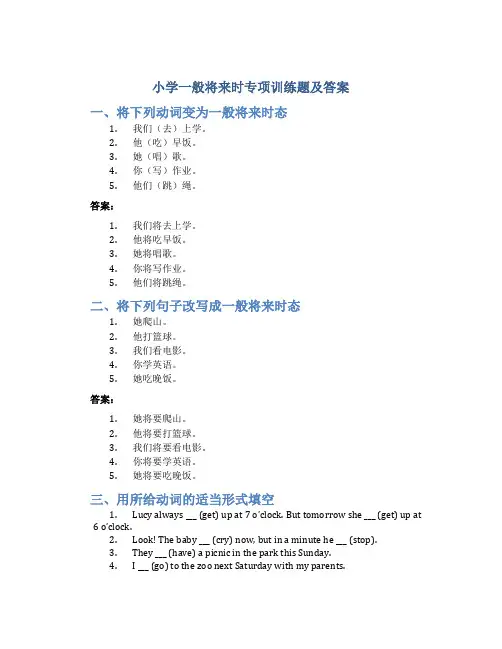
小学一般将来时专项训练题及答案一、将下列动词变为一般将来时态1.我们(去)上学。
2.他(吃)早饭。
3.她(唱)歌。
4.你(写)作业。
5.他们(跳)绳。
答案:1.我们将去上学。
2.他将吃早饭。
3.她将唱歌。
4.你将写作业。
5.他们将跳绳。
二、将下列句子改写成一般将来时态1.她爬山。
2.他打篮球。
3.我们看电影。
4.你学英语。
5.她吃晚饭。
答案:1.她将要爬山。
2.他将要打篮球。
3.我们将要看电影。
4.你将要学英语。
5.她将要吃晚饭。
三、用所给动词的适当形式填空1.Lucy always ___ (get) up at 7 o’clock. But tomorrow she ___ (get) up at 6 o’clock.2.Look! The baby ___ (cry) now, but in a minute he ___ (stop).3.They ___ (have) a picnic in the park this Sunday.4.I ___ (go) to the zoo next Saturday with my parents.5.Simon ___ (not play) football this afternoon. He ___ (have) a piano lesson.答案:1.Lucy always gets up at 7 o’clock. But tomorrow she will get up at 6o’clock.2.Look! The baby is crying now, but in a minute he will stop.3.They will have a picnic in the park this Sunday.4.I will go to the zoo next Saturday with my parents.5.Simon will not play football this afternoon. He will have a piano lesson.四、根据上下文填入适当的动词形式上一节课,我们学习了一般将来时的用法。
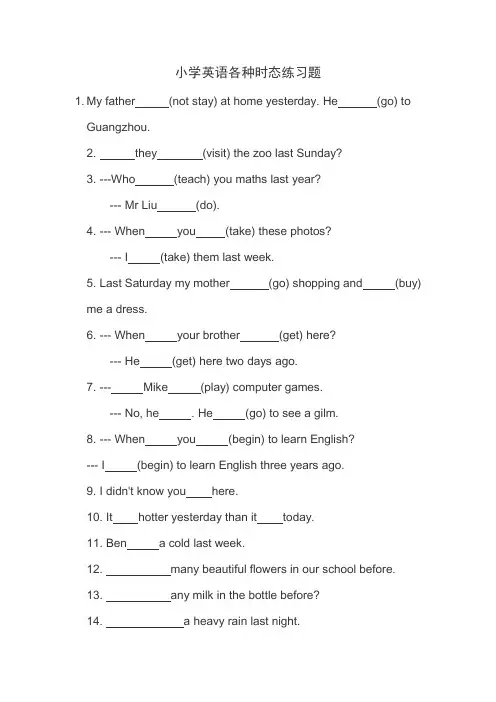
小学英语各种时态练习题1. My father (not stay) at home yesterday. He (go) to Guangzhou.2. they (visit) the zoo last Sunday?3. ---Who (teach) you maths last year?--- Mr Liu (do).4. --- When you (take) these photos?--- I (take) them last week.5. Last Saturday my mother (go) shopping and (buy) me a dress.6. --- When your brother (get) here?--- He (get) here two days ago.7. --- Mike (play) computer games.--- No, he . He (go) to see a gilm.8. --- When you (begin) to learn English?--- I (begin) to learn English three years ago.9. I didn't know you here.10. It hotter yesterday than it today.11. Ben a cold last week.12. many beautiful flowers in our school before.13. any milk in the bottle before?14. a heavy rain last night.1. Listen! Who (speak) English in the library?2. She (like) music. Now she (sing).3. Don't (run) in the street.4. you (go) to school every day?5. Class is over. The pupils (play) games.6. It's 6:30. I7. Look, the pupils (get) up.(have) an English class.8. My mother (wash) the bowls in the kitchen now.9. He (like) art very much. He (draw) a horse now.10. Let the children go away. They (make) noise here.1. We (visit) the Great Wall next month.2. My father (fly) to Beijing tomorrow.3. You (have) a seven-day holiday soon. What you(do)?4. Next week David (visit) the new zoo in Panyu.5. you (borrow) books from the library tomorrow?6. My pen is broken. I (buy) a new one this Saturday.7. They (have)a picnic in the park this Sunday.8. I (write) a letter this evening.9. He (make) a kite this Saturday.10. My mother (cook) some delicious food this weekend.1.My mother (work) in a primary school and I (study) in the same school.2.I (have) a bike and Ben (have) a bike, too.3. My sister (be) a pupil. She (study) very hard.4. Who (cook) breakfast for your family?5. My father is a teacher. He (teach) Chinese in a primary school.6. He (be) strong. He can (carry) the heavy box.7. John8. Kate often (go) to school by bike every day. (play) table tennis with her friends.9. My mother often (go) shopping and (buy) some vegetbales in the market.10. --- Who (study) hardest in your class?一一般过去式,注意动词的过去式的变化1 didn't stay, went2 Did, visit3 taught, did4 did, take, took5 went, bought6 did, get, got7 Did, play, didn't, went8 did, begin, began9 were10 was, is11 had12 There were13 Was there14 There was二一般进行时,主要注意动词的现在分词的变化1 is speaking2 likes, is singing3 run4 Do, go5 are playing6 am getting7 are having8 are washing9 likes, is drawing10 are making三一般将来时be going to1 are going to visit2 are going to fly3 are having, are, going to do4 is going to visit5 Are, going to borrow6 am going to buy7 are going to have8 am going to write9 is going to make10 is going to make四一般现在时主要注意动词的第三人称单数的变化规则1 works, study2 have, has3 is, studies4 cooks5 teaches6 is, carry7 goes8 playes9 goes, buys10 studies“”“”At the end, Xiao Bian gives you a passage. Minand once said, "people who learn to learn are very happy people.". In every wonderful life, learning is an eternal theme. As a professional clerical and teaching position, I understand the importance of continuous learning, "life is diligent, nothing can be gained", only continuous learning can achieve better self. Only by constantly learning and mastering the latest relevant knowledge, can employees from all walks of life keep up with the pace of enterprise development and innovate to meet the needs of the market. This document is also edited by my studio professionals, there may be errors in the document, if there are errors, please correct, thank you!。
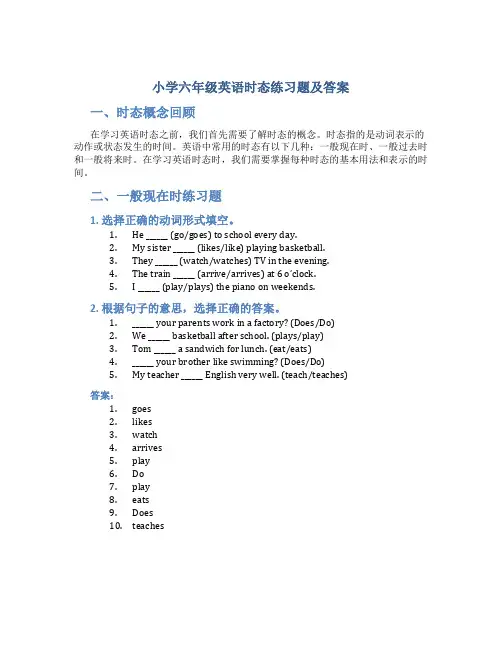
小学六年级英语时态练习题及答案一、时态概念回顾在学习英语时态之前,我们首先需要了解时态的概念。
时态指的是动词表示的动作或状态发生的时间。
英语中常用的时态有以下几种:一般现在时、一般过去时和一般将来时。
在学习英语时态时,我们需要掌握每种时态的基本用法和表示的时间。
二、一般现在时练习题1. 选择正确的动词形式填空。
1.He ______ (go/goes) to school every day.2.My sister ______ (likes/like) playing basketball.3.They ______ (watch/watches) TV in the evening.4.The train ______ (arrive/arrives) at 6 o’clock.5.I ______ (play/plays) the piano on weekends.2. 根据句子的意思,选择正确的答案。
1.______ your parents work in a factory? (Does/Do)2.We ______ basketball after school. (plays/play)3.Tom ______ a sandwich for lunch. (eat/eats)4.______ your brother like swimming? (Does/Do)5.My teacher ______ English very well. (teach/teaches)答案:1.goes2.likes3.watch4.arrives5.play6.Do7.play8.eats9.Does10.teaches三、一般过去时练习题1. 选择动词的适当形式填空。
1.He ______ (go/went) to the park yesterday.2.They ______ (watch/watched) a movie last night.3.She ______ (visit/visited) her grandparents on the weekend.4.We ______ (play/played) football yesterday.5.The cat ______ (catch/caught) a mouse just now.2. 根据句子的意思,选择正确的答案。
小学六年级英语时态专项强化训练训练目标通过本专项强化训练,使学生掌握英语基本时态的用法,提高学生对英语时态的识别和运用能力,培养学生运用英语进行有效沟通的能力。
训练内容一、一般现在时(Simple Present Tense)1. 构成:主语 + 动词原形2. 用法:描述习惯性动作、普遍真理或状态二、一般过去时(Simple Past Tense)1. 构成:主语 + 过去式2. 用法:描述过去发生的具体动作或状态三、一般将来时(Simple Future Tense)1. 构成:主语 + 将来式2. 用法:描述将来会发生的事情或打算、计划做的事情四、现在进行时(Present Continuous Tense)1. 构成:主语 + 动词be的现在时形式 + 动词ing2. 用法:描述正在进行的动作或当前阶段的暂时性状态五、过去进行时(Past Continuous Tense)1. 构成:主语 + 动词be的过去式 + 动词ing2. 用法:描述过去某个时刻正在进行的动作六、现在完成时(Present Perfect Tense)1. 构成:主语 + 动词have/has + 过去分词2. 用法:描述过去发生并对现在有影响的动作或状态七、过去完成时(Past Perfect Tense)1. 构成:主语 + 动词have/has + 过去分词2. 用法:描述在过去某个时间点之前已经完成的动作训练方式1. 实例讲解:通过具体例句讲解各种时态的用法,让学生清晰理解每个时态的特点。
2. 填空练习:设计不同时态的填空题,让学生在语境中运用所学时态。
3. 改写句子:将句子改写成不同的时态,增强学生对时态转换的掌握。
4. 情景对话:设置不同情境,让学生运用所学时态进行对话,提高实际运用能力。
训练时间共计20课时,每课时40分钟。
评估方式1. 课堂参与度:观察学生在课堂活动中的参与程度,了解学生对时态知识的掌握情况。
1 课程教案 ——时态专题
模块一:现在进行时 Warm-up 请观察下列句子,并寻找其中的规律: 1. I'm drawing pictures. 2. I'm reading a book in the library. 3. She is jumping. 4. It's eating bananas. 5. They're climbing trees. 6. He is swimming.
Presentation I. 现在进行时的定义:现在进行时一般表示正在进行的动作或事情,也可表示当前一段时间内的活动或现阶段正在进行的动作。
II. 请看下列例子: I am reading a book in the classroom. Mary is swimming in the sea. They are eating lunch now. 主语是实际的人/物/代词 be动词要和主语一致 动词的现在分词 地点状语/时间状语通常在句末
III.现在进行时的句型结构及举例: 句式 句型结构及例子
肯定式 主语+ be (am / is / are) + 动词的分词形式+ 其他 Lucy is watching TV now.
否定式 主语+ be (am / is / are) + not+ 动词的分词形式+ 其他 I am not reading a book in the classroom.
一般疑问句式 Be (am / is / are) +主语+ 动词的分词形式+ 其他 —Are you having a picnic? —No, we aren’t. —Are they eating the honey? —Yes, they are. 疑问词+ be (am / is / are) +主语+ 动词的分词形式? 2
特殊疑问句式 疑问词+ be +现在分词+其他? —What are the ants eating? —Honey. ★ be动词的用法口诀:我(I)用am,你(you)用are, is连着他(he),她(she),它(it), 单数名词用is,复数名词全用are。
IV. 动词变成现在分词形式的规则: 变化规则 例子
一般在动词词尾加ing talk-talking, buy-buying 辅音字母+e结尾的动词,去e+ing make-making, write-writing 以重读闭音节结尾,且词尾为单辅音字母的动词,将词尾辅音字母双写+ing put-putting begin-beginning
V. 常用的时间词语和短语: now, look, listen, these days等…
Practice 练一练 一.写出下列动词的现在分词形式: 动词原形 现在分词 动词原形 现在分词 动词原形 现在分词
go ride take draw play sit collect swim sweep run have see sing dance walk
二.单项选择: 1. Listen! She_____ in the kitchen. A. is doing the dishes B. do the dishes C. to do the dishing D. are doing the dishes
2. They _____ TV in the evening. A. are watching B. is watching C. watch D. watches
3. Look! Lucy is _______ a new bike today. A. not jumping B. not riding C. not running D. not taking 3
4. She is ________ swimming these days. A. learning B. learn C. learns 5. There is a monkey _______ under the big tree. A. sit B. sitting C. is sitting
6. Is she _______ something now? A. eat B. eating C. ate D. eats
7. —_____ are you eating ? —I’m eating _____ pears. A. Where, any B. What, some C. What, a D. which, some
三.用现在进行时完成下列句子: 1. —_________ you __________(fly)a kite? —Yes, _________.
2. —_________ he_________ (talk) with me? —Yes, _________. 3. I _________ (sing) an English song. 4. What ________ he_______ (mend)? 5. My mother_____________(watch TV) in the living room. 6. Look! There butterflies _________(fly) in the sky. 7. Listen! The girl _________ (sing) in the next room.
四.句型转换: 1. They are doing homework. (分别改成一般疑问句和否定句)
_______________________________________________________________________________ 2. The elephant is drinking water. (改成一般疑问句) _______________________________________________________________________________ 3. I’m writing a letter in the study. (对划线部分进行提问) _______________________________________________________________________________ 4. Wu Yifan and Mike are playing football. (分别改成一般疑问句和否定句) _______________________________________________________________________________ 4
模块二:一般将来时 Warm-up 请观察下列句子,并寻找其中的规律: 1. I will meet my best friend this afternoon. 2. She will visit her grandparents tomorrow. 3. They will go hiking next Sunday. 4. I am going to meet my best friend this afternoon. 5. She is going to visit her grandparents tomorrow. 6. They are going to go hiking next Sunday.
Presentation I. 一般将来时的定义:表示将要发生的动作或存在的状态及打算、计划或准备做某事。
II. 请看下列例子: I am going to watch TV this evening He is going to watch TV this evening They are going to play football after school. 主语可以是人或物,也可以是人称代词 be动词要根据主语变化,要跟主语一致 动词一定要用原形 地点状语/时间状语通常在句末
I will read a book in the classroom. Mary will go shopping tomorrow. They will eat lunch in the restaurant. 主语是实际的人/物,可用代词 will 动词一定要用原形 地点状语/时间状语通常在句末
III. 一般将来时的句型结构及举例: 句式 be going to式 will式
肯定式 主语+be going to+动词原形+(表示将来的时间) He is going to plant trees this weekend. 主语+will+动词原形+(表示将来的时间) He will plant trees this weekend. 否定式 主语+be not going to+动词原形+(表示将来的时间) 主语+will+ not+动词原形+(表示将来的时间) 5
We are not going to watch TV together. We will not watch TV together. 一般疑问式 Be动词+主语+going to+动词原形+(表示将来的时间)? Are they going to take a trip this Sunday? Will+主语+动词原形+(表示将来的时间)? Will they take a trip this Sunday? 注:be或will提到句首,some改为any,and改为or,第一二人称互换。 特殊疑问句式 特殊疑问词(what/when/who/ where/how等)+一般疑问句式? What are you going to do this evening? How are they going to get there?
III. 常用的时间词语和短语: next week, the day after tomorrow, tomorrow, next Monday, on the weekend, after school等…
IV. be going to 和will的区别: be going to与will都可以用来表示一般将来时。与will相比,be going to更强调计划性或是客观上必将发生的动作,其表示的意图通常是事先经过考虑的;而will通常带有说话人的主观想法,如表示“预见”,其表示的意图是说话时刻临时想到的。有时两者可互换使用。例如:I’m going to be an English teacher. On Sunday, I’m going to the supermarket with my mother. That will be fun! You will be better soon. Practice 练一练: 一.选择题: 1. —What are you going to do on the weekend? —I _________ going to take a trip. A. am B. are C. is